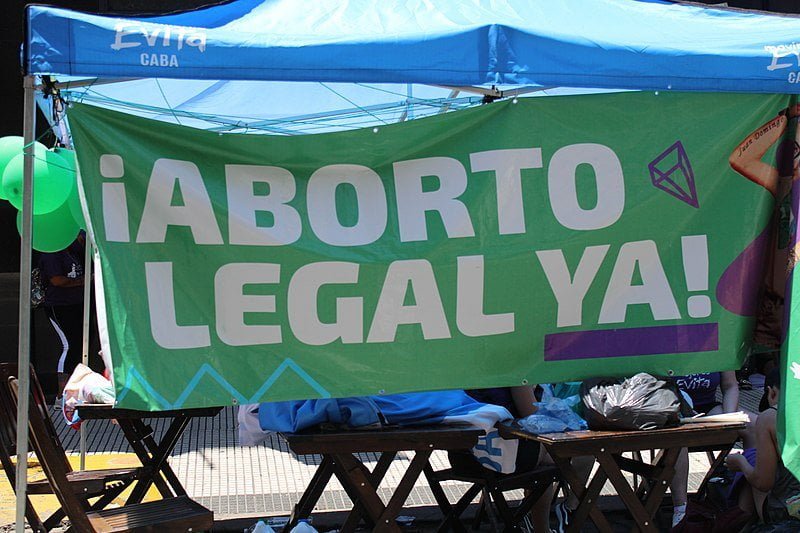From Jacobin
On December 11, after more than twenty consecutive hours of debate, the lower house of the Argentine congress voted to legalize abortion. The upper house will vote on December 29. If the law is approved, Argentina will join Uruguay and Cuba as the third country in Latin America to allow abortion without restriction.
The fight for abortion in Argentina has been building for decades, taking its current form in 2005, when the National Campaign for the Right to Legal, Safe and Free Abortion was launched. Since then, the campaign’s motto “sex education to choose, contraception to not abort, legal abortion to not die” has put into stark contrast the life-or-death stakes of the fight.
Abortion in Argentina is now only legal in case of rape, or if the life of the pregnant person is at risk. According to Amnesty International estimates, each year in Argentina, almost half a million people end pregnancies illegally, en la clandestinidad. Those who are rich and can afford it get surgical abortions in private clinics. More commonly, people induce abortions with misoprostol, an abortifacient typically prescribed to prevent stomach ulcers that, until 2018, when its sale at pharmacies was legalized, could only be accessed at hospitals. Those who can’t afford safe surgical abortions or misoprostol resort to at-home methods or shady clinics.
In 2018, the National Health Ministry reported that 35 people died from complications due to abortion, though we can guess that the actual number is higher, since the real cause of such deaths is not frequently reported, and the rates of hospitalization due to complications from abortion have historically numbered between 50,000 and 80,000 per year.

The last time Congress considered the legalization of abortion was in 2018. The campaign had gained steam, buoyed by the upswell of feminist struggle in 2016 sparked by the rape and murder of Lucía Pérez in the Argentine coastal city of Mar del Plata. Protests rippled across Latin America, and then the world. Their slogan and rallying cry, “Ni Una Menos” (Not One Less), captured the growing anger at gendered violence shaped a feminist movement in a region in which machismo saturates much of public and private life.
By the time of the 2018 vote, the marea verde — a moniker for the pro-choice movement meaning “green tide,” based on La Campaña’s green logos, banners, and the iconic handkerchiefs held up at demonstrations and tied around wrists and backpack straps throughout Argentina — was swelling.
Almost a million people flooded the streets surrounding congress on June 14, the day the lower house voted. Inside, legislators spoke in favor of legalization. Silvia Lospennato — whose pro-abortion rights position put her in the minority of her bloc, Mauricio Macri’s center-right Propuesta Republicana — delivered the concluding remarks, which ended with her reading the names of the Argentine women’s movement leaders as legislators wearing green scarves around their necks and wrists listened and cheered. Outside, a cry of sheer joy filled the street after the law narrowly passed, 129–125 against. Two months later, the law was struck down by the Senate, thirty-eight votes against and thirty-one in favor.
More than two years later, with the law before the congress again, the marea remains strong, but its opponents have gained steam. Backed heavily by the Catholic church, the anti-choice side — their slogan is “Salvemos las dos vidas” (“let’s save both lives”) — has grown in ranks and organization. One of its leading spokespeople in 2018, Amalia Granata, ran for state legislature in her home province Santa Fe in 2019 and won, turning her decades-long media career into a political one in which holding the line against abortion rights is key.
And the status quo’s defenders have grown their presence in the street, employing similar demonstration and media tactics as the abortion rights side, including handkerchiefs in light blue, one of two colors on the Argentine flag and closely associated with national identity. The message is clear: gender liberation and abortion are anti-patriotic. To oppose abortion is patriotic, to demand abortion rights is to stand against your own country.
But while the anti-choice side seems louder than it has been, the law passed the lower house with a stronger majority than in 2018, 131–117. These numbers likely reflect the electoral success of the center-left coalition Frente de Todos in last year’s elections. Like Frente de Todos, La Campaña is a coalition of Peronist, Kirchnerist, populist, and leftist organizations and parties. Their politics differ wildly, as do their tactics.
This was made clear in 2018: when the lower house voted, La Campaña deferred to the tactics of the more leftist organizations, placing their main stage right outside of Congress, so the chanting, drumming and singing of the people on the street was audible inside. The day the upper house voted, tactics shifted: the demonstration was held ten blocks away. While it might not have changed the outcome of the vote, the lowered direct pressure on Congress reflected the politics of La Campaña’s more moderate organizations, which prioritize lobbying over mass action.
But despite the obstacles to holding a multi-tendency coalition together, abortion legalization has galvanized the country. A campaign for the separation of church and state has emerged alongside the abortion fight, in part because the latter has laid bare the great influence the Catholic church still holds in Argentine politics.
Where the coalition goes now, and what new issues it intends to fight over, will be determined in the future. But La Campaña’s real mass character sets an example for left organizations across the world. If abortion is legalized on the December 29, it will be because Argentines won it in the streets.
Leave a Reply
You must be logged in to post a comment.